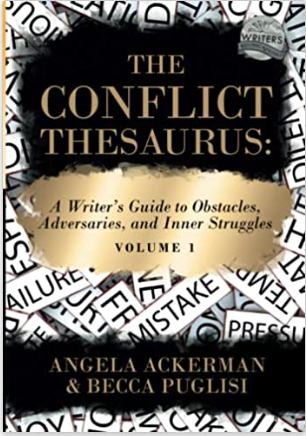Why Writer's Block can Be A Good Thing
Check out these tools I use to lift the fog.
Writing block? Yeah, it happens. But I often look at it as more of a challenge. Can’t think of something exciting to happen next?
Perfect timing.
I needed to get to know my characters better anyway. I find that writer’s block is actually beneficial for my writing.
My number one favorite way to break writer’s block is through character backstory. The next time you are ready to bang your head on the desk or your laptop, I want you to try my favorite method. A Character journal.
1. Character Journals
Character journals are the best way to get to know my character better and bring more juicy details to my story. It's usually where I get 90% of the conflict in my story.
I usually pick a random character in my story and start writing their prequel. What happened to them before your whole story started? What were they doing the day or the night before? Who were they with?
Or, I pick two characters. I write about their first encounter or a fight they had. Or maybe how the two characters' parents met. It connects my story on a deeper level each time I start one of these journals.
It is unbelievable the amount of information I come up with writing in these journals. Truthfully, it is probably something I should do during the outlining phase of my novel, but ideas don’t seem to be running through my head until I have had some tension and obstacles in my story.
2. Murphy’s Law
My number two writer’s-block-fighter: Murphy’s Law. I pull up a new file in Scrivener and literally list out the worst possible things that could happen next. Sometime, character by character.
Then I list out the best things that could happen. It’s amazing how ideas start to flow. The more dramatic, the better. Not every situation calls for that level of drama, but it always gets me thinking.
Also another awesome time to pull out one of my favorite books, The Conflict Thesaurus, by Angela Ackerman and Becca Puglisi. Their books are a gold mine for authors and they hold a trove of treasures!
An example: Hmm, the worst thing that could happen. The guy loses his job. Then what happens? If I flip open my book, The Conflict Thesaurus, it gives me examples, minor complications, potentially disastrous complications, resulting emotions, etc, etc. All from losing a job!
Side note: These ladies actually have 10 different thesauruses published out there, all the ones I have used are fantastic. My fave-The Emotion Thesaurus! You can check them out on Amazon here.
3. Read Anything
Read a book! Yeah, yeah, I know everyone says this, but it does help. It doesn’t even have to be the same genre as you are writing in. I cannot describe how my writing has improved since jumping on the Kindle Unlimited bandwagon.
I am probably far more critical of other authors now, as well. Sometimes, I will read a piece and think, “Wow, I’ll never write like that.” See? Incredibly beneficial to my writing.
4. TV
This one I may get smacked on the back of the head for, but it’s true. Watch TV. Preferably a show in that genre. I write mainly fantasy, and I cannot tell you how many good ideas I get from a good Stargate episode or the sci-fi fantasy cartoons my child watches all day long.
I don’t care what anybody says. For me, TV works! (Sorry Mom!)
5. Brain dump
Have a Brain Dump! My husband would often receives text from me while he was no doubt walking around a train yard, doing his job. I’m sure he would read it and shake his head.
When you are stuck, nothing is flowing, and even character journals aren’t helping, it’s officially time for a brain dump. Or, heck, do the brain dump first.
Unload it all. Describe your story and what is going on to someone who will listen. Tell them where it stopped, tell them how great it was going, just talk about the story.
My husband is a great listener, and sometimes just him asking questions about my story was enough to kick my brain into action. Sometimes that’s all we need. Questions.
He likes to play the devil’s advocate a bit. You know, he’ll say, “Wait—if this happens, then how did this happen?” He’ll totally stump me. #Facepalm!
Why didn’t I notice that? Just talking and going back through the story is sometimes all it takes. Ask someone what they like. What they don’t like. What they thought was going to happen.
JUST TALK. Talk to a friend, the dog, the baby—anyone who will listen!
6. Rework
Though this one is my least favorite, it is sometimes the most effective. When I am truly stumped, and nothing is helping. I go back to the place in the story where I got stuck.
Then I backtrack.
Usually I find there is a spot in the story where I started to feeling kind of ‘eh’ about it. So I’ll start there. Rework it. Cut the last chapter, or two, or paragraph. ALWAYS save those deleted scenes. I have a file in Scrivener for that purpose.
Even thought it is a complete drag, when I do it, it usually livens up my story. I can always tell where I started to go downhill in a manuscript—and that is the point you need to find. Where things went sour. Rework it, folks!
Well, there it is! Six of my favorite things to do when I get writer’s block—and truthfully, sometimes I’m glad they happened! Things like character journal, brain dumps, and reworking scenes can take time, but they have been super for my writing skills.
I am a firm believer that everything happens for a reason. So if I am stuck in a story it means I need to dig a little deeper.
Fantastic things can happen when you are forced to stretch your mind for some ideas!
Happy Writing!
Michelle
Get a list of 10 FREE Character journal Prompts here!




Check out their website, Writers Helping Writers, here
Get a list of 10 FREE Character journal Prompts here!
Check out my related posts here:
